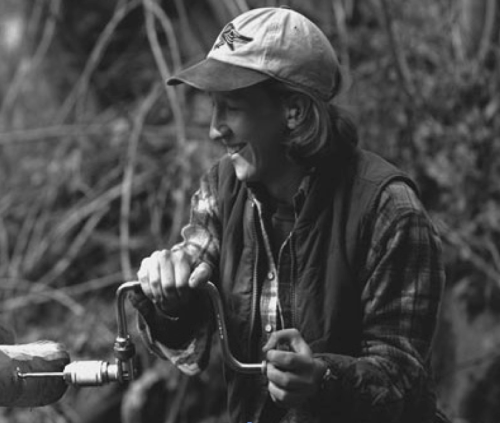Ana Maria Spagna: Writer, Trail Worker, Stehekin Resident

Ana Maria Spagna reads from her new book Reclaimers at Village Books in Bellingham on Thursday, October 8, at 7 pm as part of our Nature of Writing Fall Speaker Series; free! Read a book review by our communications coordinator Christian Martin at cascadiaweekly.com.
Like many people who choose to live in the North Cascades, Ana Maria Spagna has patched together jobs, passions, and pursuits that inform and inspire each other. Through perseverance and pluck, she has created a life and livelihood in one of the more remote communities in America: Stehekin, a village of fewer than one hundred year-round residents that is accessible only by float plane, a three-hour boat ride, or a long hike over the mountains.
Spagna grew up in Riverside, California, but a camping trip to Oregon as a teenager connected her with the natural world of the Pacific Northwest. “I loved the green forests and the blue sky and even the rain,” she remembers, “and I swore that if I ever made it back, I’d never leave.”
After graduating from college, she spent a summer volunteering with the Student Conservation Association in Canyonlands National Park, which led her to apply for jobs in other parks around the West. She landed in Stehekin in 1990 at age twenty-two to work for the North Cascades National Park.
“I had never been there, didn’t know you had to take a boat to get there,” she admits. “I arrived and saw those mountains and was completely wowed!”
The community of Stehekin sits at the northwest end of Lake Chelan, a fifty-five-mile-long fjord-like lake carved by glaciers, the third deepest lake in the country. The village is surrounded by steep mountains rising seven thousand feet above the valley floor. There are no shopping malls or Starbucks, though the internet and a few phones connect inhabitants to the outside world. Cabins are scattered for nine miles up the valley along the meandering Stehekin River. Summertime temperatures can be upward of 100 degrees Fahrenheit, while winters bring long periods of snow and subfreezing temperatures. It is a place for people who like solitude and living close to nature.
Spagna was first assigned a desk job, but she spent every weekend exploring the mountains, eventually joining a trail crew. The transitory nature of trail work had her stationed in Marblemount for a couple of years and then out of Darrington, working in the Glacier Peak Wilderness, for a few more.
She cleared trails with chainsaw, brush whips, and loppers, maintained bridges, worked on tread with a pulaski, and cleared rockslides with explosives. She would often camp in the woods for eight days at a time, putting in ten-hour days with a crew of four or five people, mostly men.
“It was empowering to learn to do the kind of work that would usually be men’s work,” she recalls. “Learning to use a chainsaw in particular was a challenge, but I gained confidence and endurance. I love the kind of work where you can see what you accomplished at the end of the day.”
All the while, Spagna was writing about her unfolding life in her journal and turning her experiences into essays. She published pieces in Orion, Utne Reader, Backpacker, Oregon Quarterly and High Country News about the North Cascades trail work, and the joys and challenges of living in a remote community.
“Stehekin is a place where you see people interacting with wild country on an everyday basis,” she explains. “It’s really shaped how I see the world and inspired my writing. I’m very leery of anything that separates nature from the human experience. The more we can see them as integrated experiences, the better our world will be.”
Her essays—displaying a keen eye for natural detail, a wry sense of humor, humility, and a generous, heartfelt style of storytelling—have been collected in the award-winning books Now Go Home and Potluck.
“Any of us doing any work, but especially writers, need some solitude, a quiet place,” Spagna reflects. “There’s something about a place that is left alone like the North Cascades that gives you the grounding to tell stories.”
Originally published in The North Cascades: Finding Beauty & Renewal in the Wild Nearby (Braided River/The Mountaineers Books, 2014), which was nominated for a Washington State Book of the Year award for nonfiction. Purchase a copy through our online bookstore and support North Cascades Institute’s efforts to get young people outdoors!

